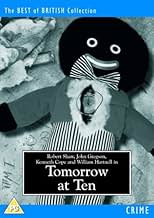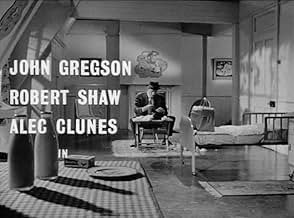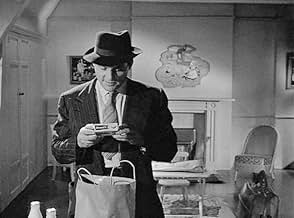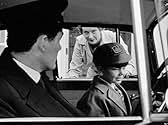Es una carrera contra el tiempo para la policía cuando tienen que encontrar a un niño secuestrado encarcelado con una bomba de tiempo, después de que su secuestrador muere sin revelar el par... Leer todoEs una carrera contra el tiempo para la policía cuando tienen que encontrar a un niño secuestrado encarcelado con una bomba de tiempo, después de que su secuestrador muere sin revelar el paradero del niño.Es una carrera contra el tiempo para la policía cuando tienen que encontrar a un niño secuestrado encarcelado con una bomba de tiempo, después de que su secuestrador muere sin revelar el paradero del niño.
Opiniones destacadas
A chap called Marlowe (Robert Shaw, Jaws fans) kidnaps a child of Hampstead parents by posing as the school-run chauffeur. After depositing the child in a deserted mansion, that resembles the one in Fallen Idol, he calmly turns up at the parent's house demanding 50 big ones. He's planning on catching the afternoon TWA to Rio see from where he'll book a long distance call to tell dad where his kid is hid. Now here's the clever bit. If he doesn't get his dough an explosive device hidden in a Golliwog will detonate tomorrow at ten and he's given the Golliwog to the child for safekeeping.
I bought this DVD from Best of British series issued by Odeon. It's the sort of thing which used to pad out afternoon schedules in the distant days of 3 channel Britain. It's directed by Lance Comfort, who made films for RKO in the 40s and even directed James Mason once upon a time. Comfort, however, never really made a big film and subsequently became lost in the culturally reviled wasteland of second features many for Butchers Film Service. In recent years there's been an attempt to re-evaluate Comfort's work. There's even been a monograph by Brian McFarlane and one of his films was compared to Resnais on this very website no less (Pit of Darkness).
This one is not quite typical of the second feature era. For a start it's a little bit later (1964) than that. Also there are a few moments that actually remove the film from the largely sealed world of the British B movie. There's even a cute reference to Z cars as Shaw whistles the theme tune while preparing the Golliwog bomb. Incidentally, I feel that an absence of any sort of popular culture from British B's of the 1957-63 era (new towns, West Indians, jeans, the teenage industry, etc) makes them strangely representative of their era. The fashion today for film makers to drench film soundtracks with the pop music of the film's era is not only a lazy way of establishing period flavour but to me rings false. Pop music may be all pervasive now for the ipod generation, if only superficially, but how many middle aged middle class people in the 50s/ 60s had any interest in pop culture beyond a vague awareness of Elvis and the Beatles maybe?
No matter, this film features John Gregson in the lead, as Inspector Parnell investigating the kidnapping, and two stars of the future in the aforementioned Shaw and Kenneth Cope (Cope pops up at the Er Golliwog Club the way the girls are dancing here has to be seen to be believed and interrogates Renee Houston who later pops up as his battleaxe mum in Carry On At Your Convenience, trivia fans). Ironically it's Gregson as the established star who is a bit miscast here. He's called to play a maverick cop who goes against his superior, Bewley (Alan Wheatley). Unfortunately, Gregson is far too meek and mild of voice and manner to carry any conviction. The film is very much of its decade though when it pits working class cop Parnell against patrician, hunt ball brown noser Bewley, who simply wants to let Marlowe skip to Brazil with his loot. Unfortunately what could have been a rip roaring barney between the two one man embodying the 1950s and the other the 1960s has all potential drama rung out of it by the laborious manner in which Parnell explains that perhaps this wouldn't be such a great idea ("What the hell are you talking about?")
Better is the psychological stand off between Parnell and Marlowe as the Inspector tries to break Marlowe down with a seemingly innocuous line of questioning. We see a little glimpse of what a great character actor Shaw was to become; the authenticity of his behaviour and accent lifting the film momentarily out of the fusty B world into something more contemporary.
I bought this DVD from Best of British series issued by Odeon. It's the sort of thing which used to pad out afternoon schedules in the distant days of 3 channel Britain. It's directed by Lance Comfort, who made films for RKO in the 40s and even directed James Mason once upon a time. Comfort, however, never really made a big film and subsequently became lost in the culturally reviled wasteland of second features many for Butchers Film Service. In recent years there's been an attempt to re-evaluate Comfort's work. There's even been a monograph by Brian McFarlane and one of his films was compared to Resnais on this very website no less (Pit of Darkness).
This one is not quite typical of the second feature era. For a start it's a little bit later (1964) than that. Also there are a few moments that actually remove the film from the largely sealed world of the British B movie. There's even a cute reference to Z cars as Shaw whistles the theme tune while preparing the Golliwog bomb. Incidentally, I feel that an absence of any sort of popular culture from British B's of the 1957-63 era (new towns, West Indians, jeans, the teenage industry, etc) makes them strangely representative of their era. The fashion today for film makers to drench film soundtracks with the pop music of the film's era is not only a lazy way of establishing period flavour but to me rings false. Pop music may be all pervasive now for the ipod generation, if only superficially, but how many middle aged middle class people in the 50s/ 60s had any interest in pop culture beyond a vague awareness of Elvis and the Beatles maybe?
No matter, this film features John Gregson in the lead, as Inspector Parnell investigating the kidnapping, and two stars of the future in the aforementioned Shaw and Kenneth Cope (Cope pops up at the Er Golliwog Club the way the girls are dancing here has to be seen to be believed and interrogates Renee Houston who later pops up as his battleaxe mum in Carry On At Your Convenience, trivia fans). Ironically it's Gregson as the established star who is a bit miscast here. He's called to play a maverick cop who goes against his superior, Bewley (Alan Wheatley). Unfortunately, Gregson is far too meek and mild of voice and manner to carry any conviction. The film is very much of its decade though when it pits working class cop Parnell against patrician, hunt ball brown noser Bewley, who simply wants to let Marlowe skip to Brazil with his loot. Unfortunately what could have been a rip roaring barney between the two one man embodying the 1950s and the other the 1960s has all potential drama rung out of it by the laborious manner in which Parnell explains that perhaps this wouldn't be such a great idea ("What the hell are you talking about?")
Better is the psychological stand off between Parnell and Marlowe as the Inspector tries to break Marlowe down with a seemingly innocuous line of questioning. We see a little glimpse of what a great character actor Shaw was to become; the authenticity of his behaviour and accent lifting the film momentarily out of the fusty B world into something more contemporary.
Detective Inspector John Gregson gets called in on a kidnapping. Robert Shaw has kidnapped a rich man's son and hidden him some place in London, with a bomb that will explode at 10 the following morning. Let him catch his plane to unextraditable Rio, and when he's safe, he'll phone in plenty of time. The man whose son has been abducted agrees. Gregson's superior agrees. Gregson thinks it's handing license to every would-be kidnapper in the country. He thinks he can break Shaw. He's making a good start, when the rich man attacks Shaw in a frenzy, rendering him unconscious.
It's a well performed little thriller, with the hurry-up-and-wait sequences very telling, and a few familiar faces in small roles; William Hartnell is present in a throwaway cameo, paired with Renee Houston. There's the stereotypical last minute race to save the boy, but even that ends with a twist.
It's a well performed little thriller, with the hurry-up-and-wait sequences very telling, and a few familiar faces in small roles; William Hartnell is present in a throwaway cameo, paired with Renee Houston. There's the stereotypical last minute race to save the boy, but even that ends with a twist.
George Marlow (Robert Shaw) devises what he thinks is the perfect kidnapping. He buys a doll and places a time bomb inside of it. He then picks a day when a chauffeur who usually takes the son of a rich man to school is ill, substitutes for him, and takes the boy to a large house that he has rented. He then locks the boy in an upper story room in the house with the doll-bomb in the same room. He goes to the rich man and says he wants fifty thousand pounds or else the bomb will go off and kill his son the next day at 10AM . Marlow says he plans to get on an international flight with the money and when he arrives at the destination he will call the rich man and tell him where the boy is so he can be rescued in time.
Not knowing anything but that the boy has been kidnapped, the nanny calls the police. Detective Inspector Parnell (John Gregson) arrives and tells Marlow he is not going anywhere, bomb or no bomb. Parnell has a long success of talking to suspects until they give something away, and he has almost 24 hours to do that here. In the meantime, Parnell is being opposed by the boy's father who even offers Parnell fifty thousand pounds to let the kidnapper go and by his own police commissioner who is a close friend of the rich man. And there are a couple of ironic plot twists along the way. I don't want to say any more than that.
This film could have gotten claustrophobic in a hurry if it was just Shaw and Gregson alone in a room verbally sparring for the length of the film, and I will tell you there is much more to it than that.
Not knowing anything but that the boy has been kidnapped, the nanny calls the police. Detective Inspector Parnell (John Gregson) arrives and tells Marlow he is not going anywhere, bomb or no bomb. Parnell has a long success of talking to suspects until they give something away, and he has almost 24 hours to do that here. In the meantime, Parnell is being opposed by the boy's father who even offers Parnell fifty thousand pounds to let the kidnapper go and by his own police commissioner who is a close friend of the rich man. And there are a couple of ironic plot twists along the way. I don't want to say any more than that.
This film could have gotten claustrophobic in a hurry if it was just Shaw and Gregson alone in a room verbally sparring for the length of the film, and I will tell you there is much more to it than that.
Suspenseful thriller in which Robert Shaw gets the lion's share as a kidnapper of a wealthy man's only son.The story almost entirely focuses on the villain and (it's rare ) tries to explain the reason why he did it .It's not only a matter of money as the viewer little by little discovers .The things themselves play a prominent part ,the ticking of the clocks or a jumping jack .The kidnapper is at hand ,under the police's eye ,like in more modern thrillers such as "oxygen" ;and of course there is a quarrel between the scared father and the police .The whole film is a race against the clock ,for the boy is in a house with a time bomb.
Just an errata and clarification for some of the above:
This little gem of a film is now under the ownership of Renown Films and is shown periodically on Talking Pictures TV (TPTV). The film was produced in 1962 as is confirmed by the titles (MCMLXII). It was released in 1963,but not well received, despite the presence of John Gregson who was a well known TV and film actor who often played the role of a police detective. However it was re-released in 1965, after Robert Shaw had appeared as the assassin Donald Grant in the second James Bond film From Russia with Love (1963). William Hartnel, who would subsequently play the first Dr. Who (1963 - 1966) also appears in a cameo as Freddie Maddox (frequently misspelled as Freddy), the father of George Marlowe (Maddox) and, with his wife Masie (Dorothy) Maddox are proprietors of The Golliwog Club.
Marlowe is not whistling the theme to Z-cars as he constructs the 'golliwog bomb', but rather is whistling the old English nursery rhyme 'Pop Goes The Weasel' and even sings a couple of lines. He is whistling an unintelligible song as he enters Abots Mead and walks up the stairs - as he approaches the second floor landing whistling can be heard in the background but it is evident from the shot that he is not whistling. The last segment as walks across the landing to the nursery does,however, resemble the theme tune of Z-cars.
The house from which Jonathan Chester is taken by the kidnapper is cited as being 14 Winnington Road, Hampstead, London N2. Whilst it is built in the neo-Georgian style of many of the larger houses towards the Highgate end of Winnington Road, it is certainly not the house which now stands there. It was in keeping with the area which wealthy financiers such as Anthony Chester (Alec Clunes) lived in the 50s and 60s.
The house at which Jonathan Chester (Piers Bishop) was kept hostage is portrayed as 'Abbots Mead' in Wimbledon, described by the estate agent, Mr. Tamplin (Frank Hawkins) as a detached house on three floors. Whilst the Wolseley police car is certainly seen driving at speed down the A3 expressway (now the Kingston Bypass) the actual location has not been verified.
This little gem of a film is now under the ownership of Renown Films and is shown periodically on Talking Pictures TV (TPTV). The film was produced in 1962 as is confirmed by the titles (MCMLXII). It was released in 1963,but not well received, despite the presence of John Gregson who was a well known TV and film actor who often played the role of a police detective. However it was re-released in 1965, after Robert Shaw had appeared as the assassin Donald Grant in the second James Bond film From Russia with Love (1963). William Hartnel, who would subsequently play the first Dr. Who (1963 - 1966) also appears in a cameo as Freddie Maddox (frequently misspelled as Freddy), the father of George Marlowe (Maddox) and, with his wife Masie (Dorothy) Maddox are proprietors of The Golliwog Club.
Marlowe is not whistling the theme to Z-cars as he constructs the 'golliwog bomb', but rather is whistling the old English nursery rhyme 'Pop Goes The Weasel' and even sings a couple of lines. He is whistling an unintelligible song as he enters Abots Mead and walks up the stairs - as he approaches the second floor landing whistling can be heard in the background but it is evident from the shot that he is not whistling. The last segment as walks across the landing to the nursery does,however, resemble the theme tune of Z-cars.
The house from which Jonathan Chester is taken by the kidnapper is cited as being 14 Winnington Road, Hampstead, London N2. Whilst it is built in the neo-Georgian style of many of the larger houses towards the Highgate end of Winnington Road, it is certainly not the house which now stands there. It was in keeping with the area which wealthy financiers such as Anthony Chester (Alec Clunes) lived in the 50s and 60s.
The house at which Jonathan Chester (Piers Bishop) was kept hostage is portrayed as 'Abbots Mead' in Wimbledon, described by the estate agent, Mr. Tamplin (Frank Hawkins) as a detached house on three floors. Whilst the Wolseley police car is certainly seen driving at speed down the A3 expressway (now the Kingston Bypass) the actual location has not been verified.
¿Sabías que…?
- TriviaAbbots Mead, the disused Victorian house (referred to in the film by its real name) where Marlow takes Jonathan after he has kidnapped him, was bought by film director Stanley Kubrick shortly after this film was made. He and his family lived there from 1965-1979 and he edited many of his films, such as A Clockwork Orange, in an outbuilding alongside the house.
- ErroresWhen Parnell and Grey first meet the local police officer near Chester's house, a cylindrical microphone windshield is very obvious at the bottom of the frame.
- ConexionesFeatured in Tienes que ver esta peli: Mañana a las 10 (2022)
Selecciones populares
Inicia sesión para calificar y agrega a la lista de videos para obtener recomendaciones personalizadas
- How long is Tomorrow at Ten?Con tecnología de Alexa
Detalles
- Fecha de lanzamiento
- País de origen
- Idioma
- También se conoce como
- Chance to Live
- Locaciones de filmación
- 91 Winnington Road, Hampstead, Londres, Inglaterra, Reino Unido(14 Winnington Road - the Chesters' house)
- Productora
- Ver más créditos de la compañía en IMDbPro
- Tiempo de ejecución1 hora 20 minutos
- Color
- Relación de aspecto
- 1.37 : 1
Contribuir a esta página
Sugiere una edición o agrega el contenido que falta

Principales brechas de datos
By what name was Tomorrow at Ten (1963) officially released in India in English?
Responda































